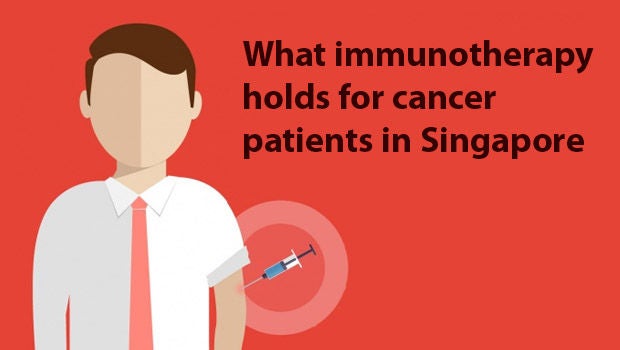
Living longer with better quality of life — what immunotherapy holds for cancer patients in Singapore
Immunotherapy may be the new kid on the block for cancer treatment but it has gained traction rapidly in recent years after proving its ability to prolong the patient's life, often without significant side effects.
Cancer is a group of diseases where the body's cells mutate and grow uncontrollably, causing destruction in their path. Depending on the type of cancer and its condition, cancer is treated by surgery, radiation therapy, chemotherapy, hormonal therapy or targeted therapy and often a combination of these treatments.
Immunotherapy, the new pillar of cancer treatment, uses the body's immune system to hunt down and kill cancer cells. Associate Professor Toh Han Chong, Senior Consultant and Deputy Director, National Cancer Centre Singapore (NCCS), explained how immunotherapy works:
"Cancer keeps on growing without being stopped because the body's immune system cannot fight it. New strategies now have enabled T-cells [a type of white blood cells], other immune cells and antibodies to attack these cancers more effectively."

Promising results
"For decades, researchers worldwide have been studying immunotherapy but with limited success. It was only in recent years that big landmark clinical studies have shown that immunotherapy can help cancer patients live longer, and with better quality of life across many cancer types," said Prof Toh, who is trained in cancer immunology and immunotherapy.
"These encouraging results have led to increased approval of its use for different cancer treatments, including using engineered T-cells to fight relapsed acute leukaemia, resulting in cure rates above 60% in a previously incurable situation.
"It is still overall a costly treatment, but prices may fall when usage widens."
The early days
In SingHealth Duke-NUS Academic Medical Centre, home to NCCS, the foray in cancer immunotherapy began over a decade ago. Prof Toh recalled the early days when immunotherapy faced its fair share of scepticism.
"We were the first in Singapore and the region to conduct clinical trials of cancer vaccines and T-cell therapy when immunotherapy had yet to come into the mainstream or widely accepted by the academic cancer community.
"Not everyone was a believer and I felt like I was swimming upstream against the tide of conventional wisdom. So I am grateful for the visionary academic leadership who believed in and supported the early days of our research then."
"Singapore has many plus points for conducting clinical trials, such as lower trial costs compared to the US, regulatory strengths and integrity, robust research ethics and English being the primary language of use."
SingHealth's role in immunotherapy
Things have changed. Today, there are many more studies on cancer immunotherapies within SingHealth, and therapies that are available to patients here. The new NCCS building, which will be ready in 2022, will have a dedicated shared National Good Manufacturing Practice (GMP) facility for processing of cell-based immunotherapy.
Prof Toh added, "SingHealth Duke-NUS has real strengths to support and grow a strong and competitive immunotherapy programme, including expertise within Duke-NUS Medical School, the SingHealth Translational Immunology and Inflammation Centre, partners across Singapore such as A*STAR, as well as a wide range of clinical trial capabilities and a large patient base." (SingHealth serves 40% of the nation's patient load)
Indeed, immunotherapy holds new promise for cancer treatment. Prof Toh also sees potential for harnessing the frontiers of immunology to treat many diseases besides cancer, and with Singapore as a leader in this emerging field in Asia.
"Singapore has many plus points for conducting clinical trials, such as lower trial costs compared to the US, regulatory strengths and integrity, robust research ethics and English being the primary language of use.
"We should position ourselves at the cutting edge of biomedical and clinical research and aim high to be a leading global player."













 Get it on Google Play
Get it on Google Play